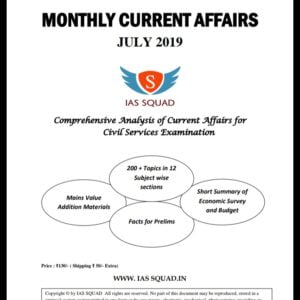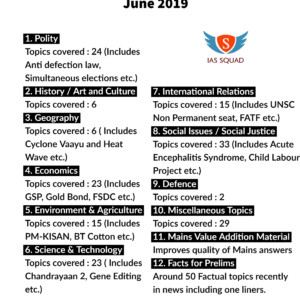PIB Analysis for UPSC CSE
Topics Covered
- 4th General Assembly of Association of World Election Bodies (A-WEB)
- Electors Verification Programme
- UNCCD COP14
- Steering Committee on Fintech related issues
- Facts for Prelims : Central Govt Health Scheme
1 . 4th General Assembly of Association of World Election Bodies (A-WEB)
Context : The Election Commission of India is scheduled to host the 4th General Assembly of Association of World Election Bodies (A-WEB) at Bengaluru on 3rd September 2019. India will take over as A-WEB’s Chair for the 2019-21 term. Over 50 countries across the globe will join the meeting at Bengaluru from 02nd to 04th September, 2019. An International Conference on “Initiatives and Challenges of Social Media and Information Technology in Elections” will also be held on 04th September, 2019.
About Association of World Election Bodies
- The Association of World Election Bodies (A-WEB) is the largest association of Election Management Bodies (EMBs) worldwide. A-WEB was established on October 14, 2013 in Song-do, South Korea. The permanent secretariat of A-WEB is located at Seoul.
- A-WEB’s vision is to foster efficiency and effectiveness in conducting free, fair, transparent and participative elections worldwide. Its activities are guided by its mission to identify latest trends, challenges and developments in democratic electoral management and electoral processes and to facilitate appropriate exchange of experience and expertise among members with the objective of strengthening electoral democracy worldwide.
- Under the slogan of ‘Democracy to Grow for All Worldwide,’ the A-WEB Secretariat provides training programs for election officials of member nations and undertakes country programs at the request of member organization, providing support during the election cycle to boost election management capacity
- At present A-WEB has 115 EMBs as Members & 20 Regional Associations/Organisations as Associate Members. 24 EMBs from Asia, 37 from Africa, 31 from America, 17 from Europe & 6 from Oceania presently are members of A WEB. ECI will continue to remain on the Executive Board of A-WEB for 2021-23 in its capacity as immediate former Chair of A-WEB.
- The current Executive Board of AWEB 2017-19 has 21 members wherein Dominican Republic as the Immediate Past Chair; 5 members from Africa namely Burkina Faso/Guinea/Kenya/Malawi/Tunisia; 4 members from Americas -Argentina/Colombia/El Salvador/Paraguay; 4 members from Asia – Bangladesh/Palestine/Taiwan/Uzbekistan; 3 members from Europe – Albania/Belarus/Croatia and Fiji as the member from Oceania are included.
- Election Commission of India has been very closely associated with the process of formation of A-WEB since 2011-12. ECI has been its Executive Board Member since AWEB’s inception in October 2013 for two consecutive terms (2013-15 and 2015-17).
At the last A-WEB General Assembly held in Bucharest on 31st August, 2017, Romania took over as Chair and ECI was unanimously elected as Vice-Chair of A-WEB 2017-19. India is all set to take over as Chair now for the 2019-21 term.
Mission and Vision
- A-WEB was founded with the shared vision among its members of achieving sustainable democracy around the world. A-WEB aims at strengthening the processes of election management in member countries.
- Since, its inception A-WEB has undertaken election ICT Programmes in various countries like Kyrgyzstan, Uzbekistan, Fiji, Papua Guinea and Samoa. A-WEB also undertakes Election Visitor and Observation Programmes in various countries to study various election management practices and share knowledge with other Member of EMBs.
- The association has organized such EVPs to Bosnia & Herzegovina, Ecuador. The A-WEB Secretariat also undertakes Election Management Capacity Building Programme for the officials from Member EMBs. Since 2014, it has conducted more than 89 programmes for over 645 participants from over 70 countries.
2 . Electors Verification Programme
About Electors Verification Programme
- The main aim of the programme is to improve the health of Electoral rolls and to provide better electoral services to citizens and increase the level of Communication between voters and the Commission.
- The program has been launched at all Levels starting from the State/UT Headquarters by 32 CEOs, District level by about 700 DEOs and at around 1 million Polling Stations by BLOs/EROs and will continue fromSeptember 1, 2019 to October 15, 2019.
- The voters can log on to NVSP portal (nvsp.in) or Voter Helpline App or Common Service Centres or any nearby voter facilitation centre to avail the following facilities.
- Verification and corrections of the existing details
- Authentication of entry by furnishing scanned/DigiLocker copy of one of the following documents:(i) Indian Passport (ii) Driving License (iii) Aadhaar Card (iv) Ration Card (v) identity card for Government/Semi Government Officials (vi) Bank Passbooks (vii) Farmer’s Identity Card (viii) PAN Card (ix) Smart Card issued by RGI (x) Latest bill for water/electricity/telephone/gas connection.
- Furnishing details of family members and verifying their entries too
- Updating details of family members already enrolled as voters but permanently shifted or expired
- Furnishing details of eligible un-enrolled family members (born on or before 01.01.2001) and prospective electors born between (02.01.2002 till 01.01.2003) who are residing with the elector.
- Furnishing GIS Coordinates of House (through Mobile App) to avail better electoral Services
- Feedback regarding existing Polling Stations and suggestions on alternate PS, if any
3 . UNCCD COP 14
About UNCCD COP 14
- Union Minister for Environment, Forest & Climate Change (MoEF&CC), Shri Prakash Javadekar and Executive Secretary, UN Convention to Combat Desertification (UNCCD), Mr.Ibrahim Thiaw jointly inaugurated the 12- day 14th Conference of Parties (COP14) to UNCCD
- This year, India being the global host for COP 14 will take over the COP Presidency from China for the next two years till 2021.
- India is p among the select few countries to have hosted the COP of all three Rio conventions on climate change, biodiversity and land.
Objective of COP 14
- The objective of the COP 14, accompanied with fourteenth meeting of Committee on Science and Technology (CST 14) and eighteenth meeting of Committee to Review the Implementation of the Convention (CRIC 18), is to discuss on various issues of land such as sustainable land management, reversing land degradation, mitigating drought, halting desertification, addressing sand and dust storms, linkages with gender, tenure, etc. and guide the Convention as global and national circumstances needs change.
4 . Steering Committee on Fintech related issues
Context : The Steering Committee on Fintech related issues constituted by the Ministry of Finance, Department of Economic Affairs submitted its Final Report to Union Finance & Corporate Affairs Minister Smt. Nirmala Sitharaman
Background
- The Committee was constituted in pursuance to the announcement made in Budget Speech 2018-19.
- The report outlines the current landscape in the Fintech space globally and in India, studies the various issues relating to its development and makes recommendations focusing on how fintech can be leveraged to enhance financial inclusion of MSMEs with a view to making fintech related regulations more flexible and generate enhanced entrepreneurship.
- The Committee report also identifies application areas and use cases in Governance and financial services and suggests regulatory upgrades enabling fintech innovations.
- The Steering Committee, which submitted the report, is headed by Secretary, Department of Economic Affairs
Recommendations
- The Committee has recommended that the RBI may consider development of a cash-flow based financing for MSMEs, development of an open-API MSME stack based on TReDS data validated by GSTN and a standardised and trusted e-invoice infrastructure designed around TREDS-GSTN integration.
- It has also recommended that Insurance companies and lending agencies to be encouraged to use drone and remote sensing technology for crop area, damage and location assessments to support risk reduction in insurance/lending business.
- Given the rapid pace at which technology is being adopted primarily by private sector financial services, the Committee recommends Department of Financial Services(DFS) to work with PSU banks to bring in more efficiency to their work and reduce fraud and security risks. Significant opportunities can be explored to increase the levels of automation using Artificial Intelligence (AI), cognitive analytics & machine learning in their back-end processes.
- The Committee has highlighted the positive impact of Fintech innovations on sectors such as Agriculture and MSMEs. And it has recommended NABARD to take immediate steps to create a credit registry for farmers with special thrust for use of fintech along with core banking solutions (CBS) by agri-financial institutions, included Cooperative societies.
- The Committee recommends a special drive for modernisation and standardisation of land records by setting up a dedicated National Digital Land Records Mission based on a common National Land Records Standards with involvement of State Land and Registration departments, with a view to making available land ownership data on an online basis to Financial Institutions.
- The Committee also recommends a comprehensive legal framework for consumer protection be put in place early keeping in mind the rise of fintech and digital services.
- It has also recommended adoption of Regulation technology (or RegTech) by all financial sector regulators to develop standards and facilitate adoption by financial sector service providers to adopt use-cases making compliance with regulations easier, quicker and effective.
- Similarly, it has also recommended that financial sector regulators develop an institutional framework for specific use-cases of Supervisory technology (or SupTech), testing, deployment, monitoring and evaluation.
- Further, an Inter-Ministerial Steering Committee will be set up on fintech Applications in Department of Economic Affairs (DEA), Ministry of Finance, to continue to carry on the tasks of implementing this report, including exploring and suggesting the potential applications in government financial processes and applications, particularly accounting and asset management, welfare services, taxation, and handling citizen grievances. While the Inter-Regulatory Technical Group (IRTG) set up under the FSDC will be the forum of inter-regulatory coordination on Fintech.
- Following the deliberations of the Committee it was considered necessary to have a nodal agency to coordinate developments across Ministries and Regulators in the area of Fintech. A dedicated team on Digital Economy & Fintech is being set up in the Investment Division, Department of Economic Affairs, Ministry of Finance for coordination on FinTech with relevant Ministries.
5 . Facts for Prelims
Central Govt Health Scheme (CGHS)
- For the last six decades Central Government Health Scheme is providing comprehensive medical care to the Central Government employees and pensioners enrolled under the scheme.
- CGHS caters to the healthcare needs of eligible beneficiaries covering all four pillars of democratic set up in India namely Legislature, Judiciary, Executive and Press.
- CGHS is the model Health care facility provider for Central Government employees & Pensioners and is unique of its kind due to the large volume of beneficiary base, and open ended generous approach of providing health care.
- CGHS provides health care through following systems of Medicine
- Allopathic
- Homoeopathic
- Indian system of medicine
- Ayurveda
- Unani
- Siddha and
- Yoga
- Eligibility for Joining CGHS
- All Central Govt. employees drawing their salary from Central Civil Estimates and their dependant family members residing in CGHS covered areas.
- Central Govt. Pensioners/family pensioners receiving pension from central civil estimates and their eligible dependent family members.
- Sitting and Ex-members of Parliament.
- Ex-Governors & Lt. Governors.
- Freedom Fighters.
- Ex-Vice Presidents.
- Sitting and Retired Judges of Supreme Court.
- Retired Judge of High Courts.
- Journalists accredited with PIB (in Delhi).
- Employees and pensioners of certain autonomous/statutory bodies which have been extended CGHS facilities in Delhi.
- Delhi Police Personnel in Delhi only.
- Railway Board employees
- Post and Telegraph Department employees.

